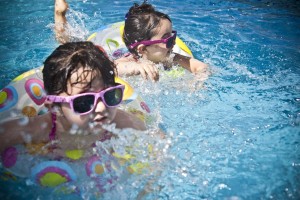 As a parent, your number one priority is the safety of your child. Swimming is an all-time favorite for children. However, you may have some concerns about the possible dangers water activity presents. From toxic chemicals to drowning risks, your reservations about swimming are completely warranted. Here are a few water safety tips that will grant you peace of mind while your child enjoys a day by the pool.
As a parent, your number one priority is the safety of your child. Swimming is an all-time favorite for children. However, you may have some concerns about the possible dangers water activity presents. From toxic chemicals to drowning risks, your reservations about swimming are completely warranted. Here are a few water safety tips that will grant you peace of mind while your child enjoys a day by the pool.
Should you be concerned about chlorine?
A pool full of people is liable to contain a multitude of pathogens. Bodies contain residue from perfumes, lotions, sweat and more. Water is also tainted by other sources such as bird droppings, decaying leaves and dead organisms. Chlorine is used to disinfect pool water, however it is an irritant that should be used sparingly. When chlorine is compounded with the other matter present in the pool, harmful disinfectant by-products can form. While this can be alarming, you can still allow your child to visit the pool, as long as you take precaution. If you can smell the chlorine, chances are there is too much in the water. Alert the pool manager of your concerns before heading to another pool. Always make your child shower before getting into the pool to rinse off any sweat and consumer product residue. Also be sure to take frequent restroom breaks to avoid any accidents in the water. Urinating in the pool contributes to the creation of those harmful disinfection by-products.
The importance of swim lessons
Proper swim instructions teach your child the basics of being in the water. They will establish independence as they learn how to relax, breath and float. Swim lessons are recommended for kids starting at age 1. It has been proven that children ages 1 to 4, are less likely to drown if they have had formal water safety instruction. If you are a novice swimmer, you may want to consider taking classes as well. Swim safety classes are typically offered by your local YMCA or American Red Cross.
Adult supervision is a must
Swim lessons are great to familiarize your child with the water, but you still must keep an eye on them at all times. Water safety classes do not prevent drowning incidents, they only help lessen them. Floaties and noodles are fun pool accessories, but do not rely on them for the safety of your child. If you would like extra protection for your little swimmer, use a Coast Guard-approved life jacket. This is the only floatation device that can prevent drowning.
Always be present with your child when around a body of water. If you are in a party environment, appoint one or two CPR certified adults to be poolside. CPR training classes are recommended for all parents as a safety precaution. You can find classes at a local fire department, hospital or recreation center.
Enforce the rules
Before visiting a pool, let your child know the importance of safety. Instruct them not to run around the water or dive in prohibited areas. They must always ask an adult for permission to swim, and if they are swimming with friends, have them hold each other accountable. If they lose sight of a friend while swimming, tell them to notify an adult or a lifeguard immediately. Enforcing these rules make accidents less likely to occur.
During the hot summer months, few things compare to a day at the pool. Children in particular are drawn to the water like magnets! When it comes to water-related activities, you can never be too safe. Using these tips will create an enjoyable, incident-free environment for you and your child!
Article courtesy of Alex Robbins of Safety Today.